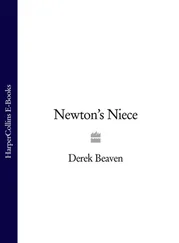GEOFFREY STOOD AMONGST the electronic paraphernalia and metallic grey cabinets that defined his days. The lab was both futuristic and foetal: there were ducts and pipes, and cables angled across the walls like rationalised veins. It was warm. There was an audible mains hum, combined with an intermittent buzzing sound. Something was switching in and out. It made him think of Louisa again. A threat hung in the air between them, so recent and out of the blue that he couldn’t see why it should be, or exactly what he might have done wrong. Of course he loved her. He filled a glass beaker with water and placed it in the specimen kiln to heat up, then closed the snug steel door and paced about.
He went downstairs to the basement where the big new electron microscope was set up beyond the clean-room barriers. Just short of the airlock, he paused. He knew the machine intimately, felt its function almost in his own body. It had its own hums and whispers, the heating and refrigerant drives for its diffusion pumps, the sense of its own electronic life. In a climate of science and specialisation, he’d specialised – and been hired here at Lidlock. Though he was young and very much the new boy, the microprobe was ‘his baby’.
He felt his body shiver in spite of the warmth. As a great telescope observed the past, so perhaps the electron beam looked into the future. Threat was writ large enough there. It was a threat that had been engineered by men just like himself and Lionel – intelligent people, scientists. Since the Missile Crisis, there was no getting away from it, no hope of keeping the rival megatonnage at some intellectual arm’s length. What was one actually supposed to do before hail and fire scorched the grass, and burning mountains toppled into the sea? The question wasn’t rhetorical. No wonder he’d shivered. Sooner or later, someone would press the button; people were even savvy about it.
At least Rae had left his warheads behind him; at least both of them were out of all that. He compressed his lips and cast an eye over the schedule of tasks pinned up before the holiday. Lidlock Ltd had been a backwater until quite recently. The company made safety systems for rotating machinery, and that was still its stock in trade – a more benign manufacture it was hard to imagine. St Albans itself had somehow remained ‘saintly’ and aloof, squeezed between the Hatfield defence complex and the Handley Page airstrip at Frogmore. And if Lidlock seemed to have done exceptionally well, with two recent units put up like glass boxes, and a lab section – the section Geoffrey had been recruited to join – hastily erected and tooled up to poke into fresh possibilities, well, what of it? Technology was expanding everywhere. The company was starting to diversify.
Technology was more than expanding. Four years previously, an engineer in Dallas, Texas, had built the first integrated circuit: virtually on his kitchen table, Jack Kilby, a self-effacing back-room boy with a knack for DIY, had etched the equivalent of a transistor, a capacitor and three resistors into a sliver of germanium. With its sticking-out wires sealed crudely in celluloid, Kilby’s finger-sized mock-up represented a breakthrough. Robert Noyce, a rival American, had made a similar invention using silicon. In only months, Texas Instruments had Kilby’s device down near the size of a pencil point; and Fairchild Corporation likewise with Noyce’s. Soon enough, there was the race to write entire textual machines on to microscopic wafers of single-crystal silicon. To those who knew , technology was about to exceed itself.
Miles away across the Atlantic, struggling with hastily adapted equipment, settling into half-finished premises and sharing temporary desk space with ‘Design’, Geoffrey’s colleagues didn’t know officially. When they saw their precocious junior fitted for his ‘clean suit’, however, and were asked to prepare him ever smaller samples of grit, they mostly guessed the drift – and the source of the funding.
Geoffrey himself didn’t, quite. That is, he guessed and didn’t guess. A country lad, snapped up on graduation at nearly a thousand pounds a year, soon married – wedded also to Apollonian notions of the common good – he still couldn’t quite let two and two make four. At school, he’d been taught by a charismatic science master. At UCL, a professor had uncovered his extraordinary flair for microscopy. Now, his bright start at Lidlock had thrust him to the very edge of the new, but he was still wet behind the ears, and his brain was fully stretched piloting his incredible new instrument over sub-miniature horizons. So the leap of dimension was too great. Computers were still adding machines the size of houses: he’d seen the immense ACE at the National Physical Laboratory in Bushy Park. It was the leading device in a country that led the world, and it could just about tackle the school timetable problem, the freeze-cooling of fish, and the simplest Fourier analyses.
No, in his conscious mind, he failed to join the dots. His research was pure, and the company – with an eye to the commercial future only – was just speculating in semiconductor techniques thrown up by the Americans. Nor was it remotely possible that this micro-calligraphy on grains of frosted rock could have summoned his fellow traveller, Lionel Rae, appearing from De Havilland’s barely a month after his own arrival.
Geoffrey returned upstairs without yet confronting the electron probe, and went to sit at the section of bench which was his office space. On the pad in front of him lay a stencilled notice that must have been circulated during the holiday. He took the biro from his jacket and idly clicked the button at the end. Hardly noticing what he was doing, he wrote the letters ‘C.S.’ at the top of the page. Then he sighed, because those two telltale initials let slip the person who was really on his mind. He glanced down at the memo.
To all Lab staff: The Requirements of the Official Secrets Act 1911, Section 2. A Reminder …
He felt his face redden, and hastily scrubbed out the two jottings. He picked up the sheet to read it.
The several recent and gravely troubling spy scandals in the news … a heightened state of alert … on our guard against any species of conduct which might render us liable to …
At the end of its three paragraphs was the signature of Bob Butterfield, the company’s managing director.
He glanced around nervously, until he saw that there was a copy for everyone. He relaxed. It was nothing. In fact, when he read it again, the memo cheered him immensely. It wasn’t like Butterfield to dream of Reds under the bed. The likely case, surely, was that some civil servant on high had got into a flap and issued a directive to every boss in the region with a government contract. It was certainly no secret that Lidlock supplied a minor safety device for Victor jets. Butterfield was just passing the flap down.
Geoffrey pictured the Yorkshire engineer’s bottled fury at the risk to his pension from sexual goings-on. Amused, he vaguely remembered having signed something when he’d joined. But the idea of anyone at Lidlock having the inclination to sidle off in search of a Russian – for the sake of one military component – was surely far-fetched. He crumpled the memo between his palms just as Lance O’Neill burst into the lab.
‘GOOD CHRISTMAS, GEOFF?’ Hat in hand, overcoat unbuttoned, Lance was a kindred spirit. He was tall, dark-haired, only a few years older. His school-hero face glowed, and the cold had heightened the scrum injuries it catalogued: the broken nose, the notched eyebrow, the resculpted right ear. ‘Well?’ He flung his scarf on to the extraction unit and leaned back against the pipework to slap snow off his trouser bottoms.
Читать дальше












